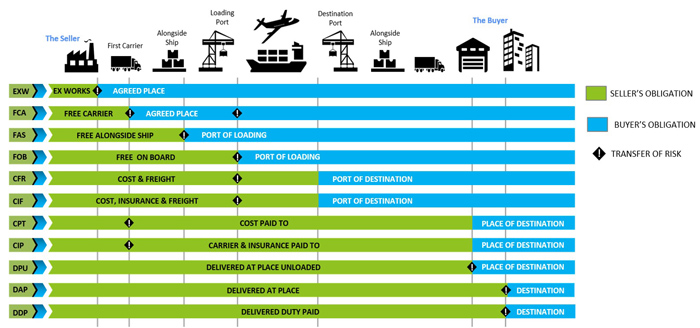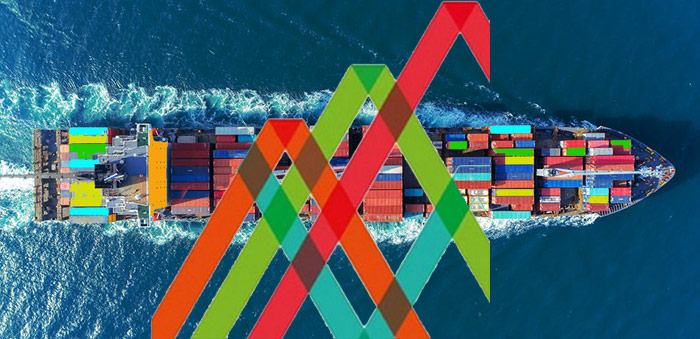Incoterms contain clauses that are accepted on a global scale, regulating logistics processes and the responsibilities of buyers and sellers. Incoterms 2020 is the last updated version. There is no any news of incoterms 2024 or a future revision. However, even if a new version is released, you can use all old versions by referring to your contract. So, for example, incoterm 2025, incoterms 2026 etc. If a new version comes out, it will not disable the old versions.
Incoterms, or International Commercial Terms, are standardized trade terms widely used in international trade to define the responsibilities and obligations of buyers and sellers. These terms were first introduced in 1936 by the International Chamber of Commerce (ICC) and have since undergone several updates to reflect changes in international trade practices.
The most recent version of Incoterms, Incoterms 2020, was published by the ICC on September 10, 2019, and came into effect on January 1, 2020. This article will explain the Incoterms 2020 rules, including what's new and changed.
Overview of Incoterms 2020:
Incoterms 2020 consists of 11 different trade terms, each defining the responsibilities and obligations of buyers and sellers in a particular way. The 11 Incoterms are divided into two categories: those applicable to any mode of transportation (also known as multimodal Incoterms) and those applicable only to sea and inland waterway transport.
The Incoterms 2020 rules provide clear and unambiguous terms for delivering goods from the seller to the buyer, including transferring risk and costs. They are designed to be used in international sales contracts and are recognized by legal authorities and practitioners worldwide. The point to note here is: Incoterms are largely compliant with, for example, US or EU trade laws, but it's not legal binding. However, you can bind it using incoterms in your sales contract and invoices.
Incoterms® rules do not apply to US Government or any other country's laws and regulations. It means that incoterms are not binding in terms of the commercial law of any country. However, there are references to incoterms in US law. So there are compatible points.
Complate List of Incoterms
Rules For Any Mode Or Modes Of Transport
- EXW (Ex works): The seller is responsible for making the goods available at their premises. The buyer is responsible for all costs and risks in transporting the goods from the seller's premises to their final destination.
- FCA (Free carrier): The seller is responsible for delivering the goods to a carrier nominated by the buyer at a named place. The buyer is responsible for all costs and risks in transporting the goods from that point to their final destination.
- CPT (Carriage paid to): The seller is responsible for delivering the goods to a carrier nominated by the buyer at a named place. The seller is also responsible for paying the cost of transportation to the named place. Still, the buyer is responsible for all costs and risks in transporting the goods from that point to their final destination.
- CIP (Carriage and insurance paid to): Its similar to CPT, but the seller is also responsible for arranging and paying for insurance for the goods while they are in transit to the named place.
- DPU (Delivered at place unloaded): Its similar to DAP, but the seller is responsible for unloading the goods at the named place.
- DAP (Delivered at place): The seller is responsible for delivering the goods to a named place agreed upon by the buyer and seller. The buyer is responsible for all costs and risks in transporting the goods from that point to their final destination.
- DDP (Delivered duty paid): The seller is responsible for delivering the goods to a named place agreed upon by the buyer and seller and paying all applicable duties and taxes. The buyer is responsible for all costs and risks.
Transport Rules For Sea And Inland Waterways
- FAS (Free alongside ship): The seller is responsible for delivering the goods alongside a vessel at a named port. The buyer is responsible for loading the goods onto the vessel and for all costs and risks in transporting them from the port to their final destination.
- FOB (Free on board): The seller is responsible for delivering the goods onto the vessel at a named port. The buyer is responsible for all costs and risks in transporting the goods from the port to their destination.
- CFR (Cost and freight): The seller is responsible for delivering the goods onto the vessel at a named port and paying the freight cost to transport the goods to the destination port. The buyer is responsible for all costs and risks in transporting the goods from the port of destination to their final destination.
- CIF (Cost, insurance and freight): Its similar to CFR, but the seller is also responsible for arranging and paying for insurance for the goods while they are in transit to the destination port.
Is Incoterms 2023 Available?
As of 2023, incoterms 2020 are still being used. The ICC renews incoterms on average every 10 years. However, technological changes and the continuous shaping of global trade can shorten this process. The next one could be Incoterms 2025? Why not.
What's New in Incoterms 2020?
Incoterms 2020 includes several new features and updates designed to make the rules more accessible and easier to use. Some of the key changes are:
1. FCA now includes an option for onboard bills of lading:
Under the previous version of Incoterms, FCA (Free Carrier) was often used when the seller delivered the goods to a carrier, but the buyer arranged for the transport. Incoterms 2020 now includes an option for the seller to request that the carrier issue an onboard bill of lading, which can provide additional security to the buyer.
2. New security-related requirements:
Incoterms 2020 includes new requirements related to security, such as the obligation for the parties to cooperate in the exchange of information on security-related matters and the need for parties to comply with any security-related procedures required by law.
3. Changes to the level of insurance coverage under CIF and CIP:
Incoterms 2020 clarifies that the seller must only obtain minimum coverage under CIF (Cost Insurance and Freight) and CIP (Carriage and Insurance Paid To). This change was made to align with current insurance practices.
4. DAT (Delivered at Terminal) renamed to DPU (Delivered at Place Unloaded):
Incoterms 2020 renamed DAT to DPU to reflect that the goods may be delivered to a place other than a terminal.
5. Security-related obligations under FCA:
Incoterms 2020 clarifies that the seller is responsible for clearing the goods for export under FCA but not for loading the goods onto the transport vehicle.
What Has Changed in Incoterms 2020?
In addition to the new features, there are some changes to the existing Incoterms rules in Incoterms 2020. Some of the key changes are:
1. Bills of lading under FCA:
Incoterms 2020 requires that bills of lading issued under FCA indicate that the goods have been loaded on the transport vehicle.
2. Costs under DDP (Delivered Duty Paid):
Incoterms 2020 clarifies that under DDP, the seller is responsible for all costs of obtaining any necessary import licenses or permits.
3. Security-related obligations under FAS (Free Alongside Ship):
Incoterms 2020 adds a new security-related obligation for the seller under FAS, which requires the seller to provide the buyer with sufficient information to enable the buyer to comply with any security-related requirements for the goods to be loaded onto the vessel.
4. Costs under CIF and CIP:
Incoterms 2020 clarifies that under CIF and CIP, the seller is responsible for the cost of obtaining any pre-shipment inspection required by the destination country unless otherwise agreed between the parties.
5. Terminal handling charges under FCA, DAP (Delivered at Place), and DDP:
Incoterms 2020 clarify that terminal handling charges are to be borne by the party responsible for delivery of the goods to the terminal or place of destination unless otherwise agreed between the parties.
Incoterms 2020 FAQ
Q: What are Incoterms 2020?
A: Incoterms 2020 are a set of rules created by the International Chamber of Commerce (ICC) that define the responsibilities of buyers and sellers in international trade transactions. They clarify the tasks, costs, and risks of delivering goods from sellers to buyers.
Q: How many Incoterms are there in Incoterms 2020?
A: There are 11 Incoterms in Incoterms 2020, each representing a different set of obligations and risks for both parties in a transaction.
Q: What are the most commonly used Incoterms in Incoterms 2020?
A: The most commonly used Incoterms in Incoterms 2020 are EXW (Ex Works), FOB (Free on Board), CIF (Cost, Insurance, and Freight), and DDP (Delivered Duty Paid).
Q: What is the difference between CIF and FOB?
A: CIF means that the seller is responsible for the goods' cost, insurance, and freight until they are delivered to the destination port. FOB means that the seller is responsible for the goods until they are loaded onto the shipping vessel at the port of origin.
Q: What does EXW mean?
A: EXW stands for Ex Works, meaning that the seller's responsibility ends when the goods are available at their premises or at another agreed-upon location.
Q: What does DDP mean?
A: DDP stands for Delivered Duty Paid, meaning that the seller is responsible for all costs of delivering the goods to the buyer's premises, including import duties and taxes.
Q: Are Incoterms legally binding?
A: Incoterms are not legally binding but widely accepted as a standard in international trade. They provide a common language and rules for buyers and sellers to follow.
Q: How do I choose the right Incoterm for my transaction?
A: The choice of Incoterm depends on the specific circumstances of the transaction, such as the mode of transportation, the destination, and the level of risk and responsibility that each party is willing to assume.
Q: Do I need to use Incoterms in my contracts?
A: Using Incoterms in your contracts is not mandatory, but they are recommended to clarify and avoid misunderstandings between the parties involved in the transaction.
Q: Where can I find more information about Incoterms 2020?
A: The official ICC website provides comprehensive information about Incoterms 2020, including the full text of the rules and guidance on their use.
Conclusion:
Incoterms 2020 provides a standardized set of rules that can
help simplify the process of international trade. They provide clear and
unambiguous terms for delivering goods from the seller to the buyer,
including transferring risk and costs. The new features and changes in
Incoterms 2020 are designed to make the rules more accessible and easier to
use while also reflecting changes in international trade practices. By using
Incoterms 2020, parties can avoid misunderstandings and disputes and ensure
that their international sales contracts are clear and enforceable.
Source: ICC INCOTERMS 2020 GUIDELINE
Written by: Aykut Alan





















Very detailed article, good work
ReplyDelete